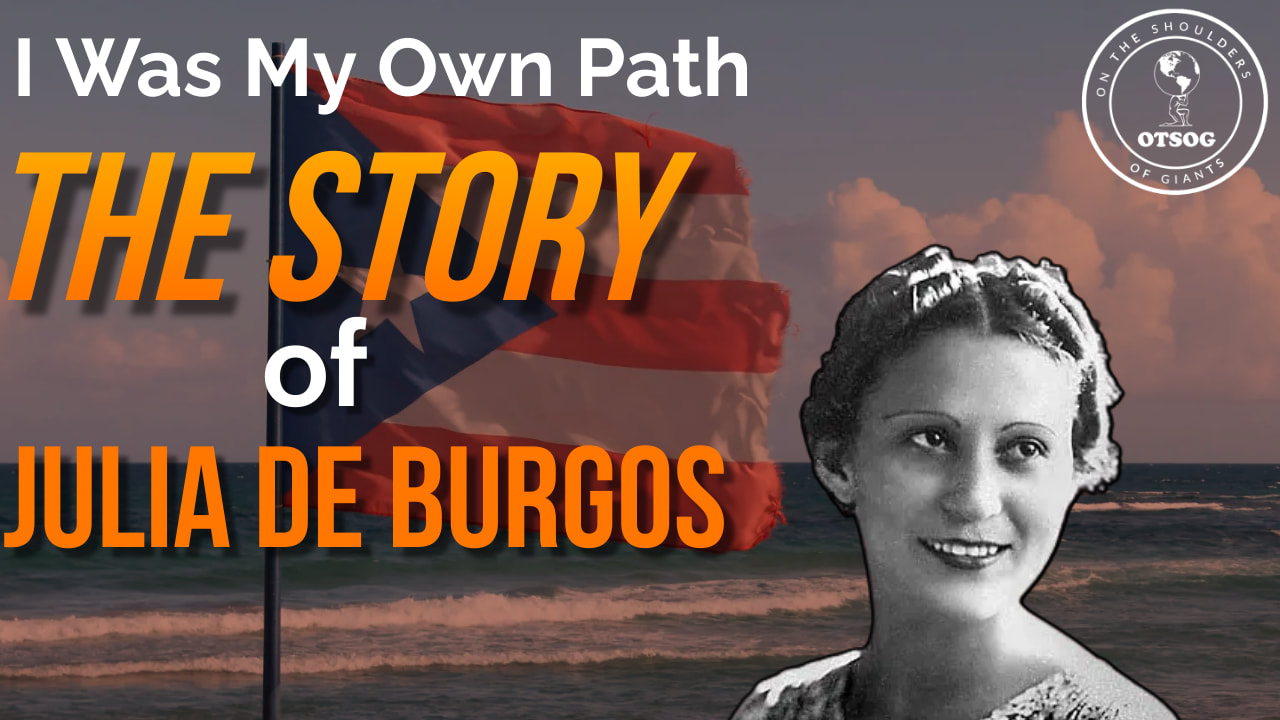|
On February 17, 1914, Julia Constanza Burgos García was born on a farm near the town of Carolina, Puerto Rico, to a working-class family. Francisco Burgos Hans was her father and Paula García de Burgos was her mother. Francisco was a farm owner and member of the Puerto Rico National Guard. Paula was a homemaker who sold the produce she harvested. Francisco and Paula produced thirteen children, Julia was their eldest child. Unfortunately, six of their thirteen children died before reaching adulthood because of malnutrition. In 1928, the Burgos family moved to the district of Rio Piedras, following Julia’s graduation from the Muñoz Rivera Primary School. She attended the University of Puerto Rico’s Rio Piedras Campus at the age of sixteen, she graduated in 1931 at the age of nineteen earning her teaching degree. After graduating college, Julia began teaching in the city of Naranjito, Puerto Rico at Feijoo Elementary School. In addition to teaching, Jilua worked a side job as a writer for a children’s radio show on Puerto Rican public radio. The messages coming from the radio program Julia wrote for were considered politically incorrect at the time. As a result, Julia was fired from Feijoo Elementary School. This was the beginning of the end of Julia’s teaching career. Julia married a man named Ruben Rodriguez Beauchamp in 1934. After the couple was married, Julia would never teach again. She was active in Puerto Rican politics and became a member of the Puerto Rican Nationalist Party in 1936. The Daughters of Freedom was the women’s offshoot of the Puerto Rican Nationalist Party, she was elected as the secretary general for The Daughters of Freedom. Writing was a skill and outlet Julia often used to express her feelings about her life experiences. She was a published writer during her time as a teacher and working with the Puerto Rican Nationalist Party. She published several poems and writings in Puerto Rican newspapers and magazines. She eventually published her books, Songs of the Simple Truth, and I Was My Own Path. She was able to capture the essence of what it is to be a Puerto Rican who was oppressed and discriminated against by their government. She was also able to capture the voices of the women of Puerto Rico fighting for their equality. Being a black Puerto Rican woman who experienced poverty, death, oppression, love, and having the experience of fighting for a better way of life, had a great influence on her poetry. It allowed her to say what the average oppressed Puerto Rican was feeling and experiencing during that time. During the late 1930s, Julia traveled to Havana, Cuba to attend the University of Cuba before leaving school to work as a journalist for the Pueblos Hispanos newspaper. She would also work several odd jobs to make a living. She married Armondo Martin in 1943, but the couple divorced in 1947. It is said that after this divorce and other failed relationships, she suffered from depression which led to alcoholism. In 1953, Julia was hospitalized because of health complications. During this time, she wrote her last poem "Farewell in Welfare Island." It is believed that she predicted her death within this poem. Julia died on July 6, 1953, in Manhattan, New York. Tragically, at the time of her death, no family or friends knew of her death and were not present to identify her body. Eventually, she was identified by a relative and was given a proper burial. Her poetry was rediscovered by later generations and she inspired readers because her poetry was so relevant to the reader. Julia’s legacy was able to continue living because of the life that Julia injected into her poetry and other writings. A total of ten of her literary works were published, two biopics were made about her life, her poems inspired musical compositions, and received over 17 honors, including being inducted into the New York Writers Hall of Fame in 2011. To Julia De Burgos, we proudly stand on your shoulders. J.A. Ward Click the link to support the OTSOG book series. References: https://www.encyclopedia.com/women/encyclopedias-almanacs-transcripts-and-maps/de-burgos-julia-1914-1953 https://en.wikipedia.org/wiki/Julia_de_Burgos https://www.blackpast.org/african-american-history/julia-de-burgos-1914-1953/
0 Comments
Leave a Reply. |
Details
Categories
All
Click Here to join our mailing list
|
Contact Us: |
Connect With Us |
Site powered by PIT Web Design


 RSS Feed
RSS Feed



